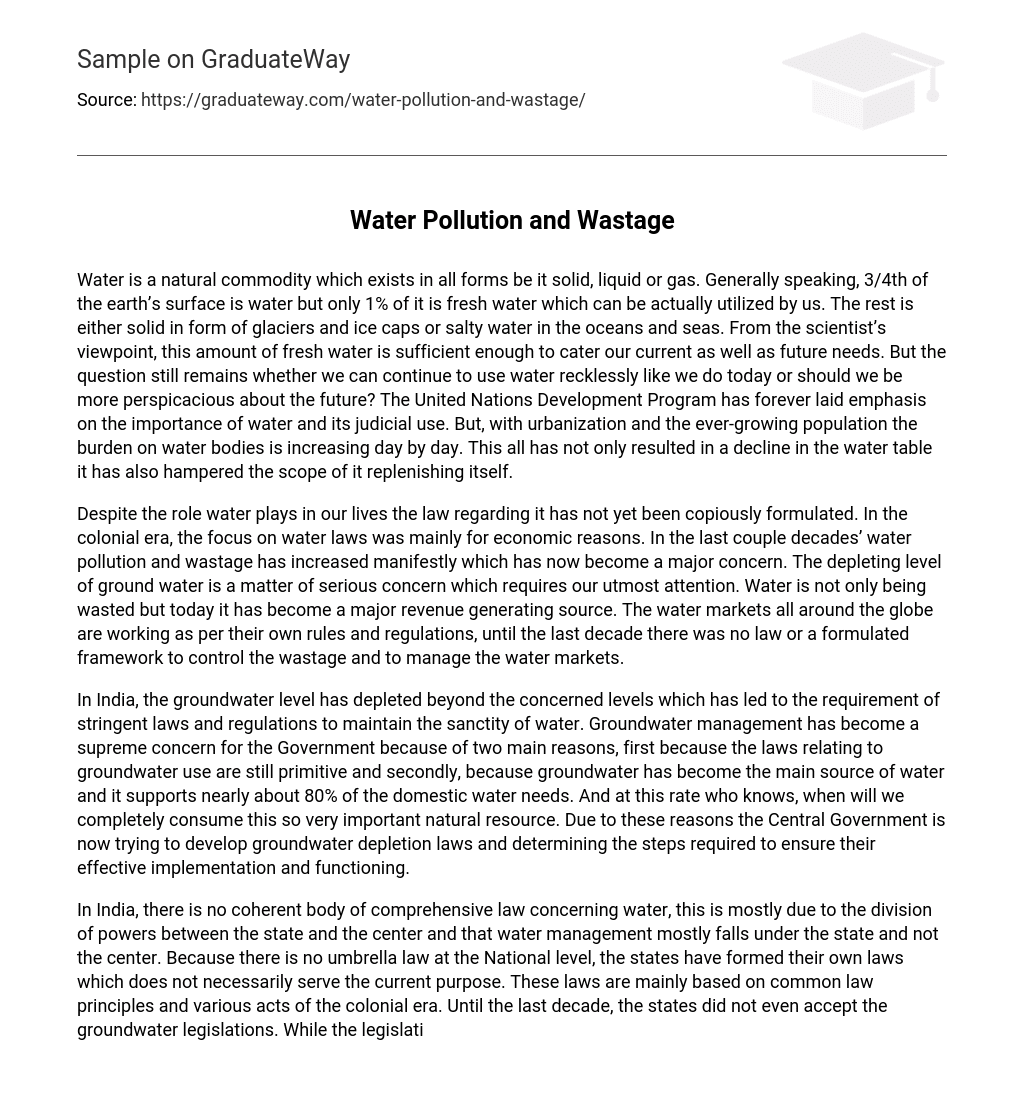Water is a natural commodity which exists in all forms be it solid, liquid or gas. Generally speaking, 3/4th of the earth’s surface is water but only 1% of it is fresh water which can be actually utilized by us. The rest is either solid in form of glaciers and ice caps or salty water in the oceans and seas. From the scientist’s viewpoint, this amount of fresh water is sufficient enough to cater our current as well as future needs. But the question still remains whether we can continue to use water recklessly like we do today or should we be more perspicacious about the future? The United Nations Development Program has forever laid emphasis on the importance of water and its judicial use. But, with urbanization and the ever-growing population the burden on water bodies is increasing day by day. This all has not only resulted in a decline in the water table it has also hampered the scope of it replenishing itself.
Despite the role water plays in our lives the law regarding it has not yet been copiously formulated. In the colonial era, the focus on water laws was mainly for economic reasons. In the last couple decades’ water pollution and wastage has increased manifestly which has now become a major concern. The depleting level of ground water is a matter of serious concern which requires our utmost attention. Water is not only being wasted but today it has become a major revenue generating source. The water markets all around the globe are working as per their own rules and regulations, until the last decade there was no law or a formulated framework to control the wastage and to manage the water markets.
In India, the groundwater level has depleted beyond the concerned levels which has led to the requirement of stringent laws and regulations to maintain the sanctity of water. Groundwater management has become a supreme concern for the Government because of two main reasons, first because the laws relating to groundwater use are still primitive and secondly, because groundwater has become the main source of water and it supports nearly about 80% of the domestic water needs. And at this rate who knows, when will we completely consume this so very important natural resource. Due to these reasons the Central Government is now trying to develop groundwater depletion laws and determining the steps required to ensure their effective implementation and functioning.
In India, there is no coherent body of comprehensive law concerning water, this is mostly due to the division of powers between the state and the center and that water management mostly falls under the state and not the center. Because there is no umbrella law at the National level, the states have formed their own laws which does not necessarily serve the current purpose. These laws are mainly based on common law principles and various acts of the colonial era. Until the last decade, the states did not even accept the groundwater legislations. While the legislation is not at all fundamental and is unequivocal its implementation is far worse.
There is no formal water market in India, but certain informal markets have existed since the 1920s. Water markets in India are seasonal, unregulated, private and fragmented due to which its regulation becomes a tedious task. Groundwater is often treated by the person overlaying it as their own private property. The informal water market is also driven with excess supply of water to generate more income for the sellers. They tend to dig deeper and there is competitive groundwater extraction which results in major exploitation of groundwater level. Today, the sellers have created a monopolistic water market where they decide the rate without even considering the buyer.
To ensure that the development of water markets and the protection of water go hand in hand the government must initiate the formation of a formal water market in India. This will be possible only by framing proper laws, rules, regulations and statutes to monitor and control the water market. Emphasis should be laid on expanding the current water market to provide better opportunities to both the buyers and the seller. Steps must also be taken to differentiate land rights from groundwater rights. After that there can be allocation of water rights legally which would ensure comprehensive water trading in a formal and regulated manner. There must however be an extensive study on both the economic and environmental aspects of water market and only then a judicious framework can be developed.
The need of the hour is a policy framework which is comprehensive and an integrated approach is required to solve the current water development chaos. Such a policy would ensure better management of the water resource and ensure that it is not vulnerable anymore. The government should form a policy, set targets and also monitor the functioning of the system. Every water sector industry should be given specific guidelines and their targets must be set which must be achieved only then we can ensure a better tomorrow for all of us. Only after this we will be in a situation to face the challenges of water sector in the 21st century.





